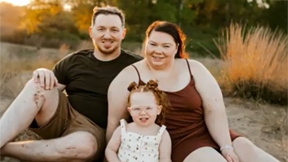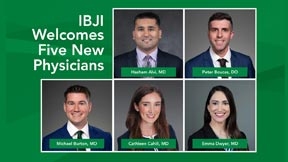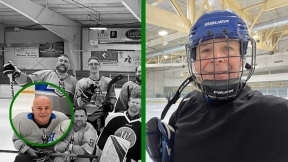DES PLAINES, Ill., May 4, 2020 — Illinois Bone & Joint Institute (IBJI), the largest independent, physician-owned orthopedic practice in Illinois, is preparing to reopen for elective surgeries and musculoskeletal procedures. The decision comes in accordance with Governor Pritzker’s announcement that Illinois will be lifting restrictions on elective surgeries starting on May 11th.
Throughout this COVID-19 period, IBJI offices, physical therapy services, MRI centers and affiliated surgicenters have remained open with a focus on evaluation and treatment of urgent and emergent musculoskeletal care.
With the extensive number of patients having their care interrupted as a result of the pandemic, IBJI Chief Medical Officer, Dr. William Robb explains the criteria surgeons will apply to rescheduling procedures. “Most of the surgeries during the first few weeks of reopening will be the cases that have been waiting the longest and are most critical to get done quickly. Orthopedic cases will include new rotator cuff tear repairs, new torn knee ligament and/or meniscus tear repairs, severe hip, knee and shoulder arthritis joint replacements and spine surgery for nerve compression.”
While we work to reopen, we realize that there is a high volume of patients waiting for surgery. “There is more than two months of orthopedic surgical cases and procedures waiting. Hospitals and surgicenters will have reduced capacity initially based upon new COVID safety workflows for patients, staff and facilities. The combination of the backlog and limited capacity requires these patients to be prioritized based upon how much their surgical outcome might be harmed if they are required to wait longer,” says Dr. Robb.
Due to the high volume of rescheduled procedures, we appreciate the understanding and patience from our patients as we work with hospitals and surgery centers to adapt to comply with the recommended guidance. IBJI staff will be reaching out to patients on an individual basis to discuss rescheduling options.
Under established IDPH guidelines, all patients scheduled for surgery will be required to complete a COVID-19 screening test 72 hours prior to surgery. In addition to working with affiliated hospital systems, IBJI will offer surgery patients an on-site testing location at our Des Plaines office facility.
At IBJI, the safety of our
This article is part of the Ultimate Guide to Knee Pain Relief and was updated in May 2021.
If you’re an athlete or a jogging enthusiast, you could be at risk for runner’s knee.
Any sport or exercise that forces you to regularly bend your knees, can put you at risk. Low impact sports (such as bicycling) and high-impact sports (such as basketball) carry some level of risk of developing the symptoms of runner’s knee.
Keep reading to learn more about this condition and how it’s treated.
What Is Runner’s Knee? What Does It Feel Like?
Runner’s knee is the name commonly used to describe two different medical conditions:
- Patellofemoral Syndrome (which feels like sharp pain below your knee cap)
- Iliotibial Band Syndrome (which causes tenderness, aching, and burning on your knee’s side)
The disorders that often cause runner’s knee include:
- Knee Injury Due to Trauma
- Repetitive Motion
- Tendons Stretched Too Far
- Bones That Are Slightly Out of Place
- Excessive Weight
- Weak Muscles in the Upper Leg
- Foot Problems That Cause the Patients to Walk Differently
Some of the Symptoms Associated with Runners Knee Are:
- Pain When Your knee Is Bent
- Pain Near the Top of the Knee
- Swelling in Your Knee
- Painful Popping Noises When You Move Your Knee
- Going Downstairs Makes Your Pain Worse
- Pain Behind Your Kneecap (Patella)
- Grinding Noise When You Move Your Knee
- Pain After Sitting for a Long Time
- Pain When Transitioning from Sitting to Standing
- Pain When Squatting or Lunging
Common Running Mistakes that Can Cause Runner’s Knee
IBJI’s Dr. Sean Sutphen says, “Patients with runner’s knee have unequal distribution of stress or contact about the knee cap that is causing pain. Continuing to run when having pain could increase the intensity of pain and lengthen the recovery time.”
To help prevent the likelihood of getting runner’s knee, Dr. Sutphen advises, “If you’re a runner, you should consider changing your shoes every 300-400 hundred miles. Stretch before running, the most important muscle groups to stretch before running are the quadricep muscles and IT band.”
At the time of diagnosis, Dr. Sutphen says that the patient should stop running or at least decrease running to give your knee a chance to recover and build strength in the weak muscles.
Healing From Runner’s Knee
In many cases, runner’s knee treatments are relatively simple. Your knee doctor may just advise you to use R.I.C.E. (rest, ice, compression, and elevation) as an initial treatment option. Dr. Sutphen recommends icing for 20 minutes, three to four times a day.
Patients should refrain from any activities that are exacerbating the knee pain, including lunges, squats, high-intensity workouts, and impact sports for the time being. An orthopedic physician can prescribe anti-inflammatories or physical therapy.
You should start a physical therapy program to improve the strength throughout the leg. You may also require orthotics.
“In some cases when physical therapy does not allow for significant improvement over six to eight weeks, further advanced imaging, such as an MRI, can detect possible cartilage injuries. At this point, depending on the findings of the MRI, you may need to discuss surgery with your provider,” explains Dr. Sutphen. Surgical options include arthroscopy and possible realignment of the patella.
Getting Back into Gear
Take precaution as the injury heals. Be sure to consult your doctor for clearance to exercise. If you are looking to ease back into your routine after injury, knowing your running technique can help.
Attend one of our IBJI Running Clinics to assess your running style, minimize the risk of injury, improve your running performance, and safely return to running after an injury or running hiatus. IBJI physicians and physical therapy staff will assess:
- Strength
- Flexibility
- Foot Mechanics
- Video Gait Analysis
- Home Exercise Program
- Nutrition
When accidents do happen, seek treatment. If you believe you have symptoms of runner’s knee, ensure the best possible outcome by making an appointment now with board-certified orthopedic knee physicians at IBJI. If you need immediate assistance for your injury, visit one of our OrthoAccess immediate care locations.
Come to IBJI When You Have Knee Pain
Our highly-trained surgeons and knee doctors are experts in sports medicine, orthopedic treatments, and pain management. We work with every patient to create a personalized care plan based on the best options for alleviating their pain from runner’s knee and other injuries and conditions.
Move better and live better with help from IBJI. Our practice has more than 150 physicians, 100 locations throughout the greater Chicago area, expertise in knee care and all other orthopedic specialties, and comprehensive diagnostic and rehabilitation services.
Schedule online with a Knee Doctor →
*This content is for information only and is not intended to replace the diagnosis, treatment, or medical advice from your treating healthcare professionals. The content does not provide medical advice, does not constitute the practice of medicine or other healthcare professional services, and does not create a doctor-patient relationship. You should not rely on this information as a substitute, nor does it replace professional medical advice, diagnosis, or treatment. If you have concerns or questions, seek the advice of your healthcare professionals. If you think you may have a medical emergency, call your doctor or 911 immediately. Do not rely on electronic communications or communicate through this website for immediate, urgent medical needs. This website is not designed to facilitate medical emergencies. The use of the information is at the reader’s own risk. The links are provided for information and convenience only. We cannot accept responsibility for the sites linked or the information found here. A link does not imply an endorsement of a site.





